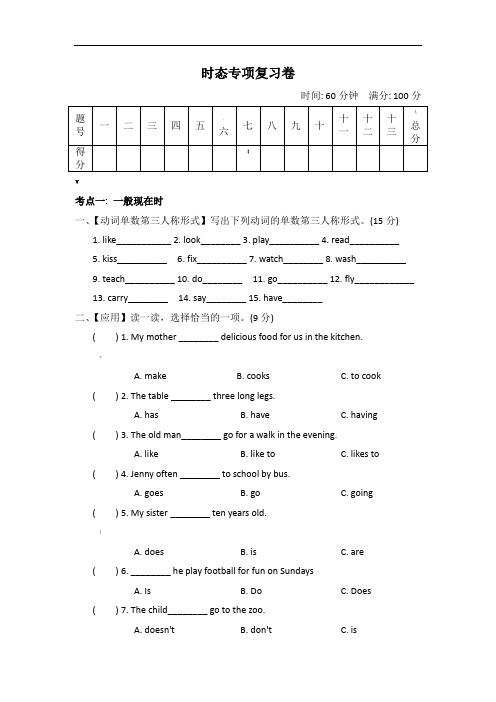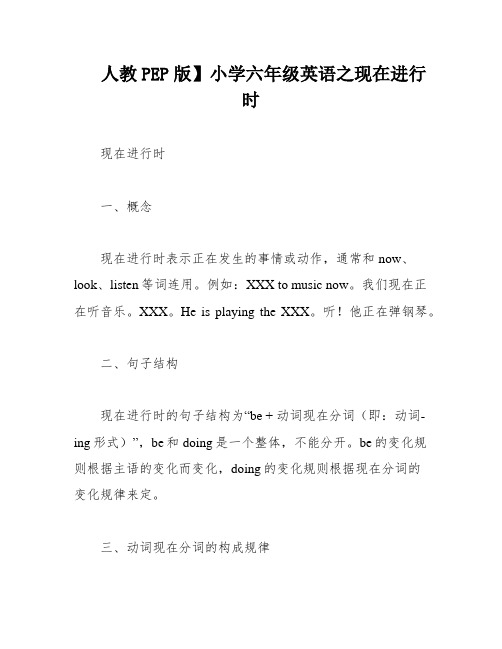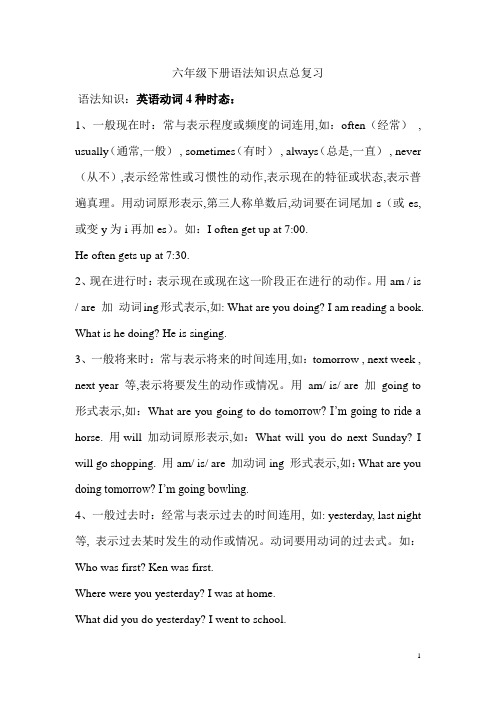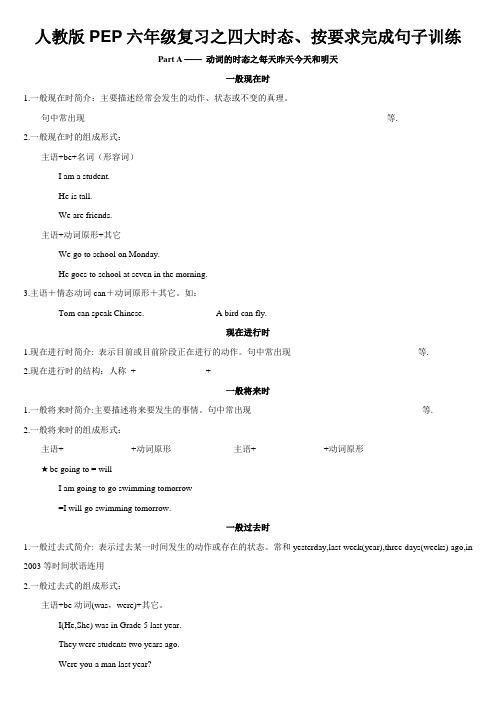小学英语pep一般现在进行时的复习
人教PEP英语小升初时态专项复习卷(含答案)

时态专项复习卷时间: 60分钟满分: 100分¥考点一: 一般现在时一、【动词单数第三人称形式】写出下列动词的单数第三人称形式。
(15分)1. like___________2. look________3. play__________4. read__________5. kiss__________6. fix__________7. watch________8. wash__________9. teach__________ 10. do________ 11. go__________ 12. fly____________13. carry________ 14. say________ 15. have________二、【应用】读一读,选择恰当的一项。
(9分)() 1. My mother ________ delicious food for us in the kitchen.>A. makeB. cooksC. to cook() 2. The table ________ three long legs.A. hasB. haveC. having() 3. The old man________ go for a walk in the evening.A. likeB. like toC. likes to() 4. Jenny often ________ to school by bus.A. goesB. goC. going() 5. My sister ________ ten years old.{A. doesB. isC. are() 6. ________ he play football for fun on SundaysA. IsB. DoC. Does() 7. The child________ go to the zoo.A. doesn'tB. don'tC. is() 8. The sun ________ in the east every day.A. riseB. risesC. rising()9. He________his teeth, ________ his face and then ________ breakfast.…A. brush; wash; haveB. brushes; washes; haveC. brushes; washes; has三、【句型练习】按要求完成下列句子。
PEP六年级英语下册总复习(一般现在时和现在进行时)

六年级英语下册练习(一般现在时和现在进行时复习)一、写出下列单词的第三人称单数。
1. do2. go3. watch4. read5. play6. buy7. study8. fly9. wash 10. live 11. teach 12. come 13. want 14. like 15. have 16. water 17. become 18. look 19. write 20. listen 21. say 22. help 23. make 24. take 25. visit 26. put27. run 28. set 29. empty 30. sweep 31. collect 32. cook 33. jump二、写出下列句子的一般疑问句。
1. They do sports every day .2. Chen Jie does housework every day .3. Mike flies kites every Sunday .4. Miss White teaches us English .5. I have some new stamps .6. I often read books on Sundays .7. He goes to school on foot .8. She likes reading books .9. Mike wants to be a teacher one day .10. My sisters watch TV on the weekends .11. My father goes to work by subway .12. Tom usually plays football after school .13. We make kites on Sundays .14. The cloud comes from the vapour .15. The vapour comes from the water .16. He watches TV every evening .17. I eat dinner at seven .18. I like watching TV .三、写出下列句子的否定句。
小升初英语语法现在进行时(讲义)人教PEP版英语六年级下册

2024年小升初英语语法精讲精练第四章现在进行时一、定义:【考点精讲】定义:表示说话时或现阶段正在进行的动作。
【实战演练】判断下列句子是(T)否(F)为写作进行时。
( )1. She eats an apple everyday.( )2. They are playing football on the playground now.( )3. There is some water on the floor.( )4. The dog is running after a cat.( )5. The Greens are having lunch now.二、现在进行时的基本结构:【考点精讲】总结:结构:主+am/ is/are+现在分词(V+ing).1.肯定:He _________ _________ (do) homework.否定:He _________ _________ (do) homework.Yes/No Question:— _________ he _________ homework?—Yes, he _________ ./No, he _________ .Wh/How Question:—What _________ he _________ ?2.肯定:We _________ _________ (do) homework.否定:We _________ _________ (do) homework.Yes/No Question:— _________ you _________ homework?—Yes, we _________ ./No, we _________ .Wh/How Question:—What _________ you _________ ?【实战演练】用括号中动词的适当形式填空:1.My parents _________ (watch)TV now.2.Look.!Three boys _________ (run).3.What _________ your mother _________ (do) now?4. _________ your dog _________ now?(sleep)5. _________ you _________ (listen) to music?Yes,I am.三、词形变化(现在分词):【考点精讲】总结:⑴ 直接+ing watching looking⑴ 去e+ing giving making ing⑴ 双写最后一个字母+ing sitting putting running⑴ 以ie结尾变ie为y加ing lielying diedying tietying【实战演练】写出下列动词的现在分词go _________ listen _________ play _________ e _________ sing _________ have _________ write _________ dance _________ sit _________ read _________ 四、现在进行时的基本用法【考点精讲】⑴ 表示说话时正在进行的动作,常和now, look, listen 连用。
人教PEP版】小学六年级英语之现在进行时

人教PEP版】小学六年级英语之现在进行时现在进行时一、概念现在进行时表示正在发生的事情或动作,通常和now、look、listen等词连用。
例如:XXX to music now。
我们现在正在听音乐。
XXX。
He is playing the XXX。
听!他正在弹钢琴。
二、句子结构现在进行时的句子结构为“be + 动词现在分词(即:动词-ing形式)”,be和doing是一个整体,不能分开。
be的变化规则根据主语的变化而变化,doing的变化规则根据现在分词的变化规律来定。
三、动词现在分词的构成规律1.一般情况下,在动词原形后直接加-ing,例如:work → working,do → doing,play → playing。
2.以不发音字母e结尾的动词,先去掉e,再加-ing,例如:dance → dancing,come → coming。
3.在重读闭音节(即:辅音+元音+辅音)的动词中,要先双写末尾的辅音字母,再加-ing,例如:get → getting,shop → shopping,run → running,swim → swimming。
4.以ie结尾的重读闭音节词,将ie改成y再加ing,例如:lie → lying,die → dying。
四、现在进行时的各种句式变化1.否定句:直接在be的后面加not,例如:They are running。
→ They are not running.2.一般疑问句:直接把be放在主语的前面,其余位置不变,例如:They are running。
→ Are they running?3.特殊疑问句:如果就划线部分提问事情或动作时,用What…doing。
例如:They are swimming in the sea now。
→ What are they doing in the sea now?相关练题一、写出下列动词的现在分词。
1.playing2.reading3.seeing4.cleaning5.studying6.going7.singing8.XXX9.saying10.eating二、用所给的动词的正确形式填空。
人教版pep小学英语六年级上册易错题时态、三单、ing

pep小学英语六年级上册易错题时态、三单、ing时态易错题一、一般现在时:主语+动词原形或动词三单+多次发生的时间(如频度副词always usually often sometimes on Mondays) 动词原形变三单规则:1.一般情况下直接加s。
2.以s/x/ch/sh/o结尾的动词加es。
3.以元音字母+y结尾的动词直接加s。
(元音字母有a/e/i/o/u)以辅音字母+y结尾的动词变y为i加es。
4.以f/fe结尾的动词变f/fe为v加es。
(仅了解)5.特殊:have的三单是has二、现在进行时:主语+be+动词ing+表示现在的时间(如now,look,listen)动词原形变动词ing的规则:1、一般情况直接加ing。
2、以不发音的e结尾的去e加ing。
3、双写最后一个辅音字母加ing:run-running,swim-swimming,shop-shopping,get-getting,sit-sitting,cut-cutting,win-winning三、一般将来时:主语+be going to +动词原形+将来时间主语+will+动词原形+将来时间(如tomorrow /this morning/this... /next week/next.../one day )一、写出下列单词的第三人称单数及动词ing形式。
1、buy _______ ________2、clean_______ ________3、help_______ ________4、find_______ ________5、pass_______ ________6、try_______ ________7、get_______ ________8、come_______ ________9、fly_______ ________10、love_______ ________11、eat_______ ________12、pack_______ ________13、wait_______ ________14、speak_______ ________15、finish_______ ________16、wash_______ ________17、watch_______ ________18、do_______ ________ 19、read_______ ________20、play_______ ________21、sing_______ ________22、dance_______ ________23、draw_______ ________24、cook _______ ________25、swim_______ ________26、learn_______ ________27、study_______ ________28、want _______ ________29、send_______ ________30、live_______ ________31、have_______ ________32、take_______ ________33、make_______ ________34、start_______ ________35、late_______ ________36、need_______ ________37、win_______ ________38、pick_______ ________39、meet_______ ________40、plant_______ ________41、look_______ ________42、climb_______ ________43、jump_______ ________44、drink_______ ________45、sleep_______ ________46、listen_______ ________47、talk_______ ________48、like_______ ________49、say_______ ________50、teach_______ ________51、catch_______ ________52、see_______ ________53、ask_______ ________54、give_______ ________55、tell_______ ________56、wear_______ ________57、visit_______ ________ 58、join_______ ________59、share_______ ________60、use_______ ________61、type_______ ________62、chase_______ ________63、hurt_______ ________64、hear_______ ________65、worry_______ ________一般现在时一、用单词的正确形式填空:1.Mike _________ (do) his homework every day.2.He _________ (like) swimming.3.We like ________ (play) basketball after class.4.I like singing. I often _________(listen) to the music in the evening.5.My grandma_________(watch) TV every day.二.单选1. ____Alice often play the piano?No, she _____.A.Do; doB. Does; doesC. Does; doesn’t2. ___ your pen pal _____ in Beijing?A. Do; liveB. Do; livesC. Does; live3. Tom and Mike_________very excited, they will take a trip.A. isB. areC. am4. I like ________ very much. What about you?A. danceB. dancedC. dancing5. Bill and I ___ good friends.A. isB. areC. am6. Sandy often ___ his homework on Sundays .A. doB. doesC. did7. What do you usually do on the weekend?I __________.A. went swimmingB. go swimmingC. visited grandparents8. What do you usually do on your holiday?A. saw elephantsB. sing and danceC.took pictures9. I ____ a student. I go to school ____bus every day.A. is; byB. am; onC. am; by现在进行时一、填空。
人教版(PEP)六年级下册英语四种时态复习

人教版六年级英语四种时态复习四种时态复习一般现在时的基本概念一般现在时表示现在经常反复发生的动作、存在的状态或习惯性的动作的时态。
常见的标志词(时间状语)主要有:every…, sometimes, at…, on Sundays, uauslly often, never, always等。
一般现在时的结构be动词的一般现在时主语+ Be动词+ 其他成分I am a boy.实义动词的一般现在时主语+ 行为动词+ 其他成分We study English.一般现在时的具体形式be动词的一般现在时1.第一人称单数I+amI am a student.2. 第二人称单数you和其他人称复数we/you/they+areYou are a lucky girl.We are students in this school.3. 第三人称单数he/she/it+isShe is my teacher.例题:用be动词的适当形式填空。
1. I from China.2. It very hot today.3. They in the hospital.4. We good students.5. She a beautiful girl.实义动词的一般现在时1.第一、二人称单数I/you和其他人称复数we/you/they+动词原形I get up at 8 o’clock.They go to school everyday.2.第三人称单数he/she/it+实义动词第三人称单数形式It runs fast.He studies hard.例题:用说给单词的适当形式填空。
1. We home every day.(go)2. Trees green in spring.(turn)3. He very hard.(study)4. The boy up at seven O'clock.(get)5. The earth round the sun.(move)补充:主语为第三人称单数形式,谓语动词的变化规则:一般现在时的句型变化be动词的一般现在时肯定句否定句He is a worker. 主语+ be动词+ not + 其他He is not a worker.一般疑问句特殊疑问句Be动词+ 主语+ 其他特殊疑问词+ 一般疑问句-Is he a worker?Where is he?-Yes, he is. / No, he is not.例题:写出下列句子中所缺的be动词,并用肯定及否定形式回答。
六年级英语下册语法知识点总复习人教PEP

六年级下册语法知识点总复习语法知识:英语动词4种时态:1、一般现在时:常与表示程度或频度的词连用,如:often(经常), usually(通常,一般), sometimes(有时), always(总是,一直), never (从不),表示经常性或习惯性的动作,表示现在的特征或状态,表示普遍真理。
用动词原形表示,第三人称单数后,动词要在词尾加s(或es,或变y为i再加es)。
如:I often get up at 7:00.He often gets up at 7:30.2、现在进行时:表示现在或现在这一阶段正在进行的动作。
用am / is / are 加动词ing形式表示,如: What are you doing? I am reading a book. What is he doing? He is singing.3、一般将来时:常与表示将来的时间连用,如:tomorrow , next week , next year 等,表示将要发生的动作或情况。
用am/ is/ are 加going to 形式表示,如:What are you going to do tom orrow? I’m going to ride a horse. 用will 加动词原形表示,如:What will you do next Sunday? I will go shopping. 用am/ is/ are 加动词ing 形式表示,如:What are you doing tomorrow? I’m going bowling.4、一般过去时:经常与表示过去的时间连用, 如: yesterday, last night 等, 表示过去某时发生的动作或情况。
动词要用动词的过去式。
如:Who was first? Ken was first.Where were you yesterday? I was at home.What did you do yesterday? I went to school.形容词的比较级和最高级:1、单音节词:比较级加er, 最高级加est. 如:tall------taller-------- the tallest,He is taller than his brother. Tom is the tallest in his class.2、多音节词和部分双音节词:比较级加more, 最高级加the most. 如:interesting---------more interesting---------the most interesting,Music is interesting subject. P.E. is more interesting than music.. Science is the most interesting subject.形容词变为比较级的变化规则:(1)一般情况下,在形容词的词尾直接加er。
四大时态按要求完成句子训练(讲义)人教PEP版英语六年级下册

人教版PEP六年级复习之四大时态、按要求完成句子训练Part A ——动词的时态之每天昨天今天和明天一般现在时1.一般现在时简介:主要描述经常会发生的动作、状态或不变的真理。
句中常出现____________________________________________________________________等.2.一般现在时的组成形式:主语+be+名词(形容词)I am a student.He is tall.We are friends.主语+动词原形+其它We go to school on Monday.He goes to school at seven in the morning.3.主语+情态动词can+动词原形+其它。
如:Tom can speak Chinese. A bird can fly.现在进行时1.现在进行时简介: 表示目前或目前阶段正在进行的动作。
句中常出现____________________________等.2.现在进行时的结构:人称+ _______________ + _______________一般将来时1.一般将来时简介:主要描述将来要发生的事情。
句中常出现______________________________________等.2.一般将来时的组成形式:主语+ _______________+动词原形主语+ _______________+动词原形★be going to = willI am going to go swimming tomorrow=I will go swimming tomorrow.一般过去时1.一般过去式简介: 表示过去某一时间发生的动作或存在的状态。
常和yesterday,last week(year),three days(weeks) ago,in 2003等时间状语连用2.一般过去式的组成形式:主语+be动词(was,were)+其它。
- 1、下载文档前请自行甄别文档内容的完整性,平台不提供额外的编辑、内容补充、找答案等附加服务。
- 2、"仅部分预览"的文档,不可在线预览部分如存在完整性等问题,可反馈申请退款(可完整预览的文档不适用该条件!)。
- 3、如文档侵犯您的权益,请联系客服反馈,我们会尽快为您处理(人工客服工作时间:9:00-18:30)。
write wash the clothes
cook the meals
writing washing the clothes
cooking the meals
make the bed
clean the board
making the bed
cleaning the board
Well done!
动词的ing形式有如下方法: A. 在动词后直接加ing: go-going , wash-washing,fly—flying B. 以单个元音+单个辅音+e结尾 , 去掉e加ing,如 :drive—driving, ride--riding C. 某些单词要双写词尾的字母: swim- swimming run—running get--getting
一般现在进行时
Let’s read.
doing jumping
drawing eating
playing sweep ing water ing
cooking drinking
answering cleaning running
fish
fly kites
fishing
flying kites
climb mountains drink water
表示正在进行的动作或事情
be动词
﹛
is are + 动词ing am
1.Mr Zheng (read) a book now. 2. The rabbits (jump) now. 3.. Look ! Tom and John (swim). 4. My brother (make) a kite in his room now. 5. Look! The bus (stop). 6. We (have) an English class now. 7. Listen! Someone is (come). 8. They (catch) butterflies now. 9. He (do) an experiment now.
She is drawing pictures.
He is reading a book.
On the playground
He is playing basketball.
Look! I am cooking dinner.
现在进行时态
I ____ am reading a book.
He ____ is cooking dinner. is playing the piano. She ___ They ____ are drawing pictures.
写一写
watch TV
climbing mountains drinking water
watching TV
take picturs
skating
swim
swimming
run play football
jump eat
running playing football
(把上边的句子改成一般疑问句,并做否定回答,注意技巧!)
10. They (collect) stamps now. 11. Look! He (dive) now. 12. Tom ( watch ) TV in the dining room. 13. The doctors (get ) off the bus. 14. Come on. They ( leave ) now. 15. It (eat) fish now. 16. My father (work) in the office now. 17. Where is your mother? She (answer) the phone. 18. The teachers (run) now.
jumping eating
sing dance plant trees
talk sweep the floor
singing dancing planting trees
talking sweeping the floor
water the flowers set the table
watering the flowers
